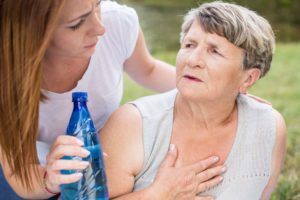Body Heat Regulation in the Elderly
 July and August bring on what is known as the “dog days of summer” – body heat, hot, muggy, sunny days that can cause lethargy and exhaustion. However, extreme temperatures that make the rest of us seek out the nearest beach or pool can have much more dire consequences for older people due to their increasing trouble with thermoregulation. It takes an older adult nearly twice the time it takes a younger person to return to average core body temperature after exposure to temperature extremes.
July and August bring on what is known as the “dog days of summer” – body heat, hot, muggy, sunny days that can cause lethargy and exhaustion. However, extreme temperatures that make the rest of us seek out the nearest beach or pool can have much more dire consequences for older people due to their increasing trouble with thermoregulation. It takes an older adult nearly twice the time it takes a younger person to return to average core body temperature after exposure to temperature extremes.
While standard body temperature doesn’t change much with aging, it does become more challenging for your body to control its temperature as you get older – noticeably so after age 70. Due to increasingly ineffective sweat glands, aging decreases the body’s ability to sweat. In addition, increased blood flow to the skin through vessel dilation (which allows warm blood to flow to the surface away from the body’s core) is also compromised during aging. Both factors put seniors at a much greater risk of potentially life-threatening disturbances of temperature regulation due to the hypothalamus and thermal receptor issues. This is why older people are vulnerable to overheating (hyperthermia) or heat stroke. To make matters worse, they also have more difficulty noticing when they are becoming too hot.
Climate change has produced a more significant variability in weather patterns, resulting in increasingly extreme weather events such as sustained heat waves. At the same time, older people are being bombarded with the message that they must stay active to remain healthy, so many feel pressured to exercise as much as possible during the summer season. Therefore, it’s critical for both seniors and their caregivers to heed the following precautions, especially during heat waves:
- If possible, install an air conditioning unit or central air in the home or residence of a senior citizen. (Some stores will even let you rent a team to get you through a heat wave.) If that is not possible, bring the individual to an air-conditioned public place like a senior center, mall, library, or coffee shop during the warmest part of the day.
- On sweltering days, older people should remain indoors. However, if it’s necessary to venture outdoors, pick a more relaxed time, such as early morning or evening.
- Keep the house as cool as possible by keeping the shades closed during the hottest part of the day or even using inexpensive mylar solar curtains.
- Dehydration can have serious consequences. Ensure the older individual drinks plenty of fluids throughout the day and does not wait until s/he feels thirsty. Ideally, each day we should try to drink between half an ounce and an ounce of water for each pound we weigh. For example, an individual weighing 150 pounds should consume 75-150 ounces of water daily. It is best to avoid caffeine and alcohol on hot days.
- If an older adult begins to feel overheated (or you notice they are hot to the touch), have them sit with their feet in a pan of cool (but not too cold) water. You can also place a cool washcloth on the back of their neck and periodically refresh it or have them take a cooling shower or bath. If the person is still too warm, cover them with a flexible ice blanket to protect their fragile older skin from direct contact using a towel.
- Monitor what older individuals eat on sweltering days. Stay away from heavier meals or hot dishes. Instead, choose light meats like chicken or colder meals like pasta salad. Eat cooling snacks like popsicles or slightly frozen grapes.
- Encourage seniors to wear layers of lightweight clothing in light-colored cotton so they can easily adjust their temperature throughout the day by removing or adding layers.
- Those with existing medical conditions, such as Parkinson’s disease, hypertension, or diabetes, should be aware that they are particularly susceptible to heat-related injuries and should be extra cautious. Also, they should realize that prescription medications can impair the body’s ability to regulate temperature and can prevent sweating.
Being aware of thermoregulation issues and following these recommended guidelines will go a long way toward keeping your loved one safe and comfortable this summer!
